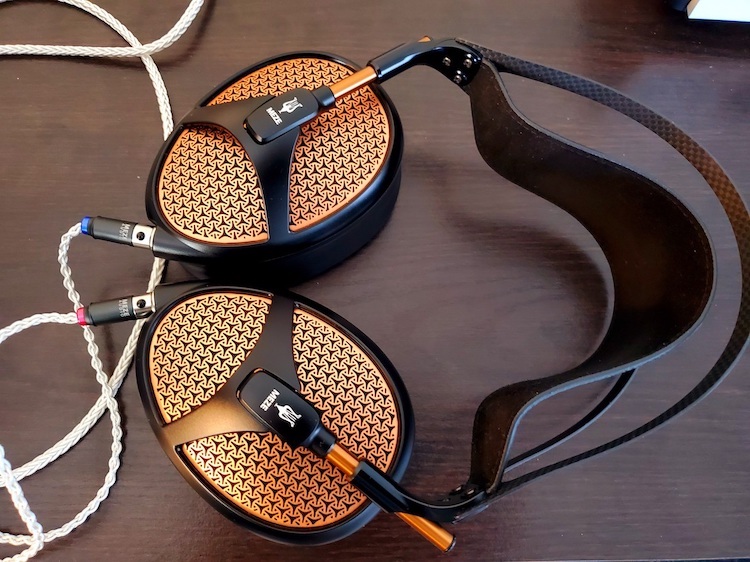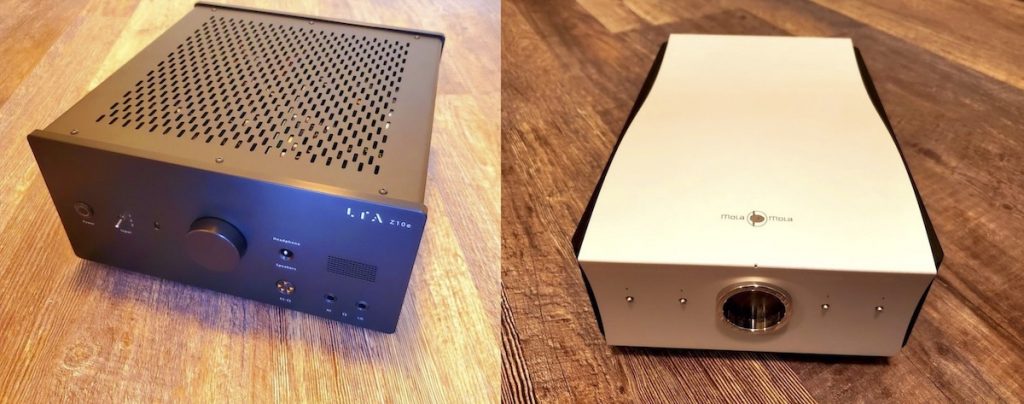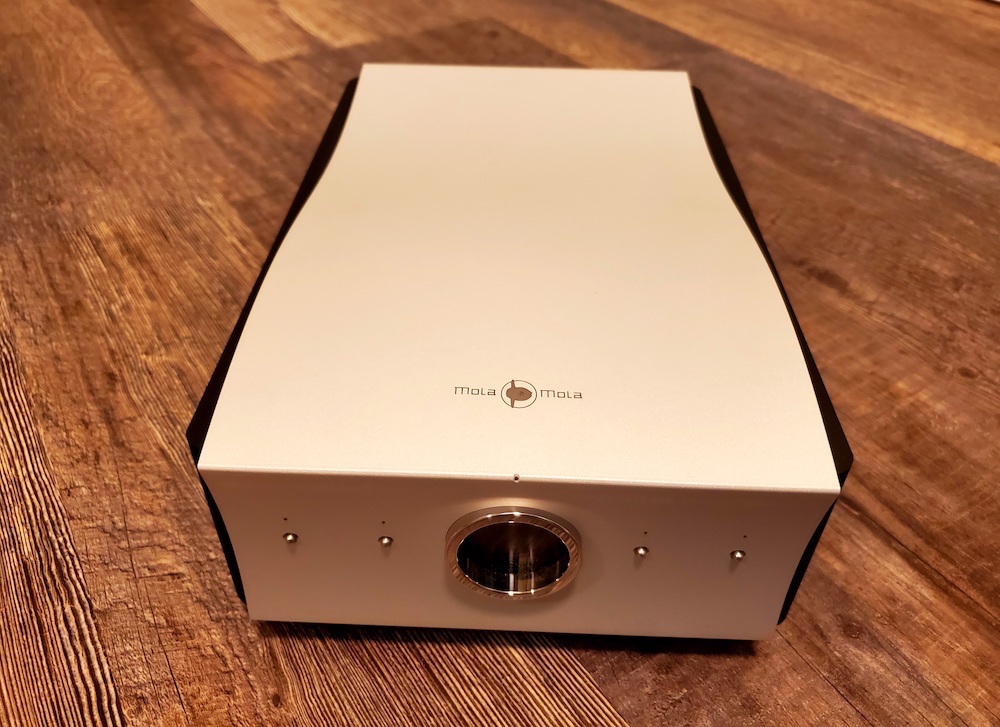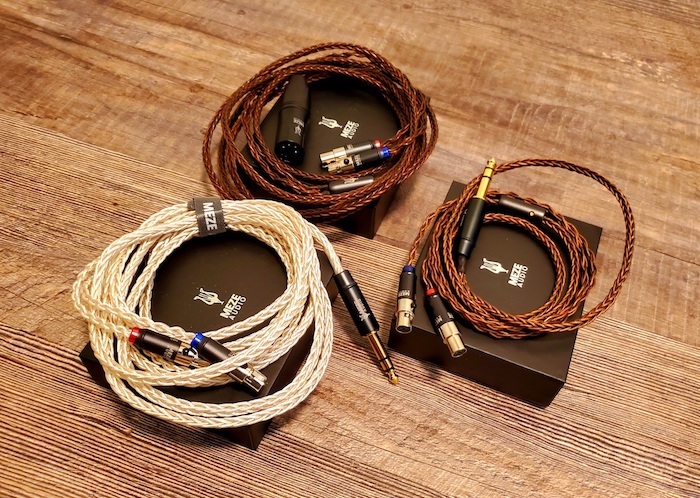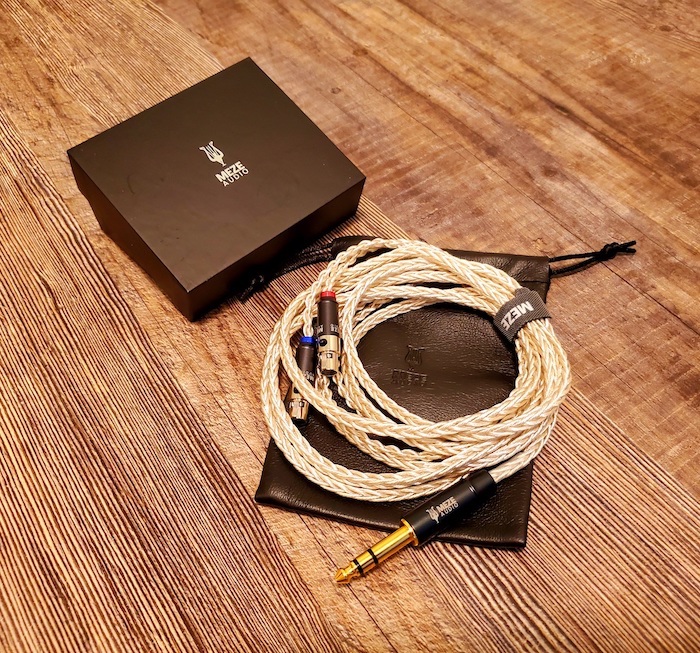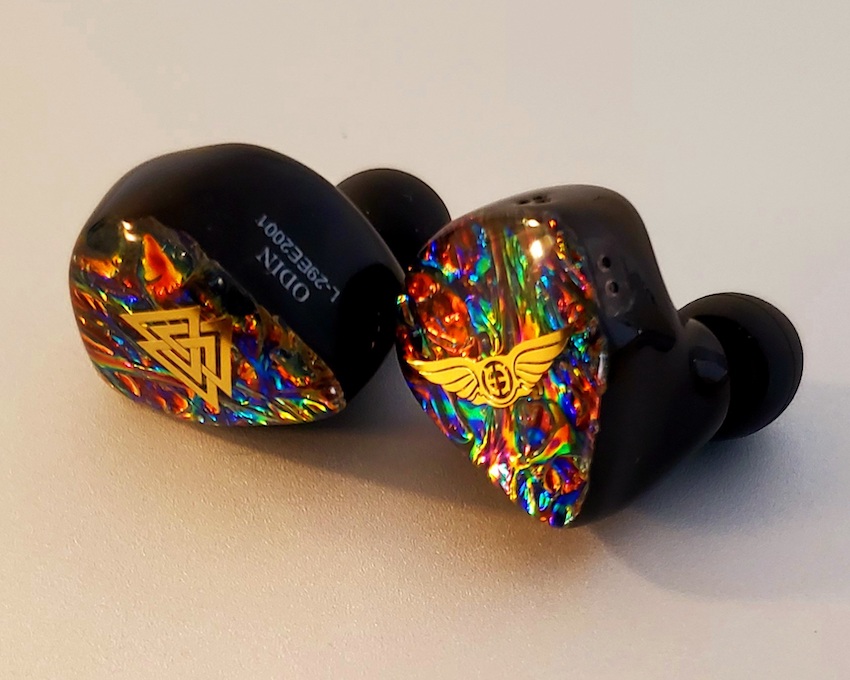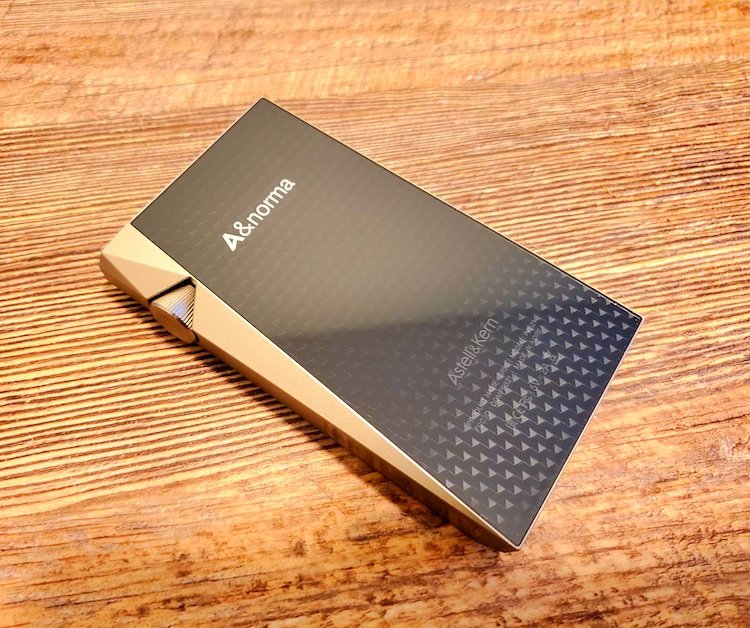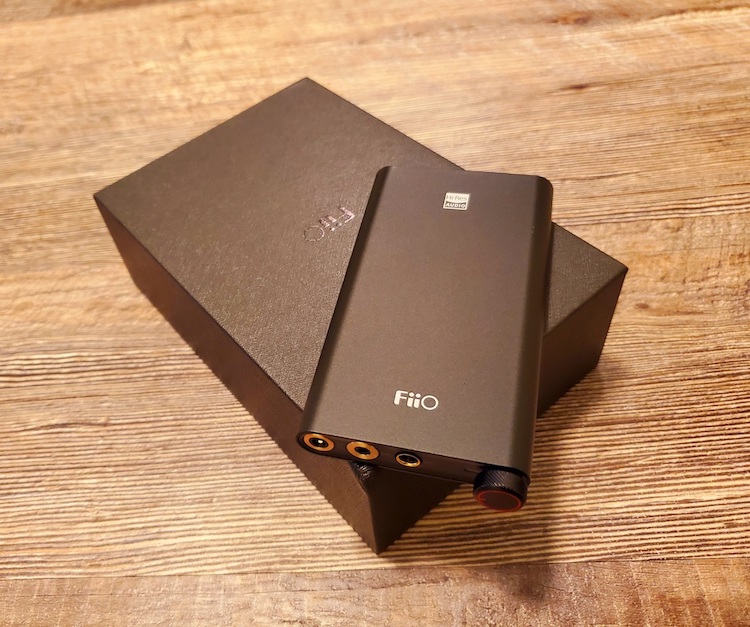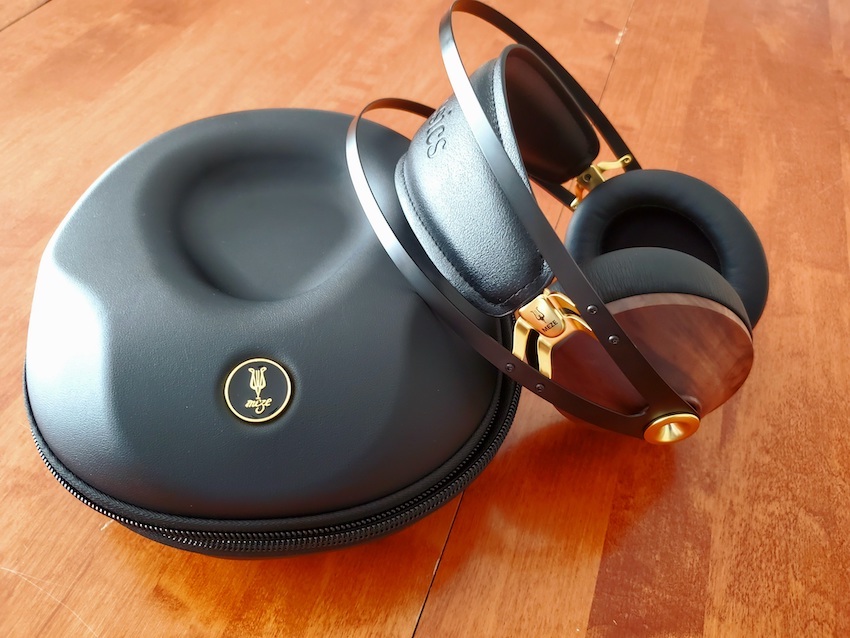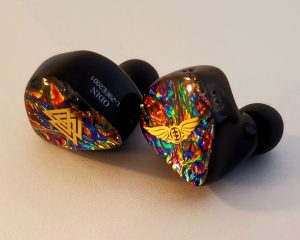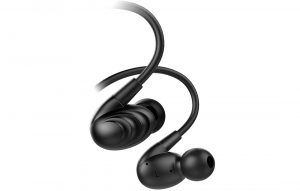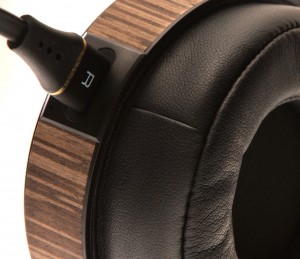The Meze Empyrean continues to be the headphone that I go to for both reviewing and for simply enjoying the music. Rare, indeed, is the product that is transparent, musical, and truly engaging. That the Empyrean is also one of the most aesthetically beautiful headphones that I have come across, easily validates a form follows function approach to its design. As I wrote in the Empyrean's review:
"Apart from its compelling modern design, the Empyrean's sound is exquisite, in the manner of its function following its form. The Meze Empyrean ($2999) is an anomaly, in that it handles the entirety of the frequency spectrum spectacularly well. And it eschews contradictions across this spectrum by delivering an "evolved experience" that 'harmonizes'—gorgeous musicality, exquisite transparency, unparalleled comfort, and truly fine, functional, modern art. Together these attributes transport the listener to the original venue or to the remembered venue and the performance in question and in a very comfortable manner. The Empyrean creates a balance that so very few have achieved and that fewer still have achieved well."
At the time of the Meze Empyrean review, I was aware of the upgrade cables—the pure copper ultra high drawability (PCUHD) cable ($249-$349) and the PCUHD silver-plated copper cable ($399-$499)—but I had not heard either. And there were scant, if any reviews save for customer reviews, that had found the cable well worth the price of admission. I was intrigued.
The Sound - Comparisons
This section will be handled a bit differently from my other reviews in that "The Sound" section will also be a "Comparison" section for the various Meze cables—standard, copper PCUHD, and silver-plated copper PCUHD—and how they sound with the selected music and as allied to the various sources, source pair listed below.
The following songs were selected for the comparisons. The song/tracks were:
- Eiji Oue's "Firebird Suite (1919 version): V. Infernal Dance of King Kashchey"
- David Holland's "Emerald Tears, Spheres" (Emerald Tears, ECM)
- Massive Attack's "Angel" (MEZZANINE, Virgin)
- Joan Shelly's song "Wild Indifference" (Joan Shelley, No Quarter)
- Olafur Arnalds' Árbakkinn (Island Songs, Mercury (Universal France))
- Kandace Springs' "Can't Make You Love Me" (Women Who Raised Me, Bluenote)
- Vilda Frang's "Allegro Molto II" (Veress String Trio/Bartók Piano Quintet, Alpha)
- Kronus Quartet's "Aaj Ki Raat" (Tonight is the Night) (Kronos Caravan, Nonesuch)
- Sara Sant'Ambrogio's "Cello Concerto in E minor, Op.85: I. Adagio-Moderato" (Elgar, Piazolla, Wolosoff, Sebastian Records)
The various sources and source pair were used in order to compare, where possible, standard copper, copper PCUHD, and silver-plated copper PCUHD across 2.5mm, 4.4mm, 6.3mm, and XLR terminations. The sources selected for the comparison were:
- LTA Z10E/ Mola Mola Tambaqui/ Cardas - 6.3mm headphone output
- Mola Mola Tambaqui - XLR headphone output
- Cayin N6II/A01 - 4.4mm headphone output
- iBasso DX220 AMP1 MkII - 2.5mm headphone output
Currently, there is not a 3.5mm single-ended cable in either of the upgrade lines—copper PCUHD, silver-plated copper PCUHD—so, of course, no comparison was to be done.
Meze standard v. copper PCUHD v. silver-plated copper PCUHD via LTA Z10E/Mola Mola Tambaqui - 6.3mm headphone output
Bass
Massive Attack's "Angel" plays, and the copper PCUHD cable as compared to the standard Meze Empyrean cable delivers a degree of texture, palpability, tautness, and drive that is not within the standard cable's ability. And given the accolades, to date, of the Empyrean with standard cables, this is rather profound. Eiji Oue's "V. Infernal Dance of King Kashchey" plays, and it is apparent that the copper PCUHD has added weight, dimension, and drive relative to the standard cable, as the copper PCUHD cable takes the weight of the tympani to a level removed from its standard sibling. The silver-plated copper PCUHD now in play, "Angel" begins once more, and something that was not expected happens. The silver-plated copper cable provides greater weight and drive and punch to the bass, while lifting detail, wherever it can, from across the breadth of "Angel." The bass of the silver-plated copper PCUHD is well extended over the warmer copper PCUHD! Eiji Oue's "V. Infernal Dance of King Kashchey" plays again, and the silver-plated copper PCUHD brings a potency, weight, transient speed, and a wealth of microdynamic detail, that were unavailable to both its siblings. In doing this a wee bit of the wetness / warmth is diminished, relative to the copper PCUHD. It is, however, the transient speed and the ability of the silver-plated copper PCUHD to hold things together, more solidly, more coherently that further distinguished it from the other Meze cables. And then there is the detail now present from the removal of a veil, that would never have been apparent had not the silver-plated copper PCUHD entered the picture.
Midrange
With the copper PCUHD in place the midrange is engrossing, organic, three dimensional, and palpable far beyond what the standard cable offered, and this is apparent immediately. There is a natural beauty to Joan Shelly's "Wild Indifference," to Kandace Springs' "Can't Make You Love Me," to Olafur Arnalds' "Árbakkinn," heretofore not present. It is as if a phantom image has now become corporeal, made so by a wealth of new information—tonal shadings, microdynamics, spatial cues, vocal articulation. There is no edge, no digital artifacts, no vacuum bereft of air. Air, space, dimensionality fully participate with the new information to recreate venue, space, performance, well above previous incarnations, and well above the standard cable. Can a $349 cable upgrade make this kind of a difference?! Yes, apparently. The silver-plated copper PCUHD now in place (though it was very difficult to remove the copper PCUHD) and the immediate differences between it and the copper PCUHD are not quite as dramatic from the standard cable but there are differences, nonetheless. Another veil lifted, you say? Indeed. Sounds once buried in the mix of Olafur Arnalds' "Árbakkinn," a track that I've listened to nearly a hundred times, are set free and are in bold relief! And with Joan Shelly's "Wild Indifference" (and other tracks on this album, I couldn't stop listening). I play Kandace Springs' "Can't Make You Love Me", and the same is also true. And yet more microdynamics come to the fore, like that second layer of chocolates accidentally discovered, as a child, beneath that fake, dark, cardboard bottom, the silver-plated copper PCUHD also reveals goodies. The nerve!
Treble+
The Kronos Quartet's "Aaj Ki Raat" (Tonight is the Night) plays, and Hindustani tabla, Lebanese nay, Iranian kemancheh, violins, viola, and cello have all taken form against a black-quiet background, from which these instruments stand out in bold relief, via the copper PCUHD. A veil has been removed from the standard Meze cable's presentation, and again, timbral shadings show themselves now distinct and separate from what remains of a noise floor. It is an organic, textured rendering that moves past simulacrum and towards a more natural, three dimensional portrayal. There is a level of transparency with the copper PCUHD that will free detail and air and microdynamics in a beautiful and very coherent manner. Many will not budge from this combination, and especially so if they consider themselves music lovers first. The silver-plated copper PCUHD doubles down. As "Aaj Ki Raat" plays, from the first strikes of the triangle to the interplay of the various exotic instruments, a wealth of detail is lifted from background and above the noise floor by the silver-plated copper PCUHD relative to its copper PCUHD sibling. Transient speed has also improved, and highs reach for the sky sweetly and beautifully free of any unwanted artifacts—sibilance, harshness, grain, stridency—and air is omnipresent. What is interesting is that in my review of the Meze Empyrean, when I was offered the silver-plated copper PCUHD to further sound out the Empyrean's strengths, I kindly turned the offer down. I have had some poor experiences with 100% silver cable that I did not want to repeat. How incredibly different has been this experiences with Meze's silver-plated copper PCUHD cables. The silver-plated copper PCUHD cable presents as a more vivid, transient quick, free of yet another veil, with incredible extension, and a soundstage whose overall volume increases even more.
Meze copper PCUHD v. Meze silver-plated copper PCUHD viva Mola Mola Tambaqui - XLR (4-pin) headphone output
Bass
Stravinsky's "V. Infernal Dance of King Kashchey" plays with a force and weight and a rumble with the copper PCUHD XLR's that is far above the single ended 6.35mm copper PCUHD cable and, certainly, the standard cable, which is not subtle. The soundstage has also broadened relative to both single ended cables, as if easily leapfrogging over them both. The quietness of the background that the copper PCUHD XLR brings is quite significant, which, in turn, brings to light Dave Holland's assured finger work on the "Emerald Tears" track, to date unnoticed. "Angel" plays now, and it is driving, its bass deep, resonant, which induces much head-rocking. The silver-plated copper PCUHD now brings an even more prodigious bass with greater force, weight, speed and additional detail that has been freed across the entirety of all, aforementioned, tracks—"V. Infernal Dance of King Kashchey," "Emerald Tears," and "Angel." There is a rumble that growls quite menacingly from background to foreground on "V. Infernal Dance of King Kashchey" via the silver-plated copper cable. And yet as the timpani fades there is a refinement far above its siblings. On "Emerald Tears" the overall palpability, lightning fast dynamics (macro/micro), and, in turn, the layering, are so pronounced as to, seemingly, stand Mr. Holland mere feet away. And whereas the copper facilitated head-rocking, the Silver via even faster transient response and drive facilitates full chair dancing, as "Angel" is now rock-solid, tight, and brimming with attitude. Dynamic and macrodynamic detail via the XLR's bring a wealth of new information to the fore with the silver-plated copper distinguishing itself beautifully above all others.
Midrange
Joan Shelly's "Wild Indifference" plays, and the quiet, the definition, the detail are notable, as is the broadening of the soundstage, which finds that tambourine (at 00:01:45) well into the room, timbrally accurate, and well resolved via the copper PCUHD XLR. On "Árbakkinn," poet Einar Georg Einarsson's recital is beautifully articulated via a clarity that, again, frees sufficient detail to give rise to not only more palpability by positioning cues, but to the various chirping birds outside of the building! Kandace Springs' "Can't Make You Love Me" is now more detailed, via the unearthing of numerous microdynamics, natural, with a "you are there quality," which the jet-black-quiet background, no doubt, helps to strengthen. The silver-plated copper cable, now in play, doubles down with greater detail, microdynamics, faster transients, and a next-level clarity, that is, nonetheless, organically rendered. In truth, we're talking component upgrades certainly via the Meze XLR upgrades. And, again, while a small measure of warmth may be absent with XLRs, in general, and with the silver-plated copper cable, in particular, this does not, at all, diminish engagement or musicality. I would be negligent if I did not speak to a farther broadening of the soundstage, spatial cues, which give clear designation to performers, and extended highs.
Treble+
The highs of the copper PCUHD XLR while extended are sweet, replete with detail (micro/macro), and texture, that promote, again, a wonderful sense of three dimensionality and positioning, via the wealth of spatial cues. Further, there is a beautiful decay of notes, a marvelous tonality and tonal shading that finds "Aaj Ki Raat" layered, and its instruments spread over a broad stage. There is also additional information provided, which finds the surface of drums and their reverberant interiors now fully resolved. Sara Sant'Ambrogio's "Cello Concerto in E minor, Op.85: I. Adagio-Moderato" is beautifully rendered as textures across her bowed cello make themselves apparent and quite distinct. Enter the silver-plated copper PCUHD and there is simply more—more transparency, more spaciousness, more detail, and more coherency (across the board, truly). And the highs are now even more extended, resolved, without the slightest hint of sibilance, stridency, grain. The detail springs from an ever more quiet background, that its siblings approach, to varying degrees, but can not match. On Vilda Frang's "Allegro Molto II" the knuckle raps, plucks, bows, etc. are very clearly separated, standing in their own space, surrounded by air, as the various tones decay. The silver-plated copper PCUHD brings a finesse and refinement above all of its siblings. And finally via silver-plated copper PCUHD Sara Sant'Ambrogio's passion in "Cello Concerto in E minor, Op.85: I. Adagio-Moderato" is brought to the fore via simply more transparency, air, microdynamics, and, again, it is not a subtle change above other Meze cables. I imagine, those who search for detail and quiet, above all, will be well rewarded with the silver-plated copper PCUHD.
The Wrappings and Accessories
The various Meze Empyrean upgrade cables come in a small, black, rectangular box, that bears the Meze logotype and the Meze Audio name printed in silver on its top face. The back face of the box, printed white, with a graphic that morphs from rectangle to oblong shape, identifies the particular cable's composition—copper, silver-plated copper—and its connector type—2.5mm, 4.4mm, 6.3mm, or XLR.
Inside each box a black, faux leather pouch, with the Meze logo stamped of its face, fills the box. Within the pouch the cable as identified from the outer box's back face.
The packaging is very clean, elegant, and well designed in what has become a trademark for the various Meze products and their containers.
Design - Look and Feel and Technology
The Meze copper PCUHD cable wears a dark, bronze-copper colored sleeve (TPE), and the cable is braided, oxygen-free, with a purity that is 99.99% (5 ppm or less). Each copper PCUHD cable is composed of twined wire that is 0.04mm in diameter, with 140 conductors in an eight-wire braid, that becomes a four-wire braid, which terminates to mini, 4-pin XLRs. The copper PCUHD cable is substantial, textured to the touch, and free of both memory and microphonics.
The Meze silver-plated, copper PCUHD cable wears a white-silver colored sleeve (TPE), that is also braided, the cable is oxygen-free, with a purity that is 99.99% (5 ppm or less). Each silver-plated, copper PCUHD cable is composed of twined wire that is also 0.04mm in diameter with 140 conductors in an eight-wire braid, that becomes a four-wire braid, which terminates to mini, 4-pin XLRs. The silver-plated, copper PCUHD cable is beautiful, substantial, smooth to the touch, and also free of both memory and microphonics.
Both upgrade cables were manufactured to specification for Meze Audio by the Japanese technology company, Furukawa Electric, which has been in operation since 1884. Furukawa has developed products for automobiles, telecommunications, construction, and it works with three main materials—optics, plastics, and metals.
However, when it comes to copper, and to copper cables, in particular, Furukawa has developed a patented process that virtually eliminates one of copper's most common impurities—oxygen—and the result is its four nines (4N) grade purity copper wire. This is achieved as Furukawa states:
"By combining a molding process that uses no heat resistant materials with post-processing free from hot extrusion or rolling processes, the product can be mass-produced in a way that excludes inclusions and impurities. While the product is a 4N grade material (copper purity 99.99%), it possesses high malleability and drawability that allows processing up to superfine wires."
The remaining oxygen impurities are reduced to five parts per million (5ppm). The results of this process provide for a highly conductive wire, with the best possible corrosion resistance, low volatility, and a relatively clear "freeway" for electrons. One way of looking at impurities is, perhaps, best described by the following analogy.
"Now, think of the impurities in copper wire like knots in a rope, around which electrons have to navigate. Travelling around these impurities can cause phase shift and distortion that degrades sound quality"
Well, there you have it. The Meze upgrade wires are beautifully executed, come nicely packaged, and, as discussed above, brings a world of improvement that lifts the headphones to even higher levels of performance! And relative to some of the quite costly cables on the market, the Meze cables are reasonable in the extreme, a bargain!
The Specifications
Meze Empyrean silver-plated copper PCUHD
- Braided Furukawa silver-plated copper PCUHD
- 4 pin mini-XLR headphone termination
- 0.04 mm*140 conductors in 8 wire to 4 wire continuous braid
- PCUHD (Pure copper Ultra High Drawability) silver-plated single crystallized
- Each strand is silver-plated
- USA made TPE Sleeve
- Jensen 4% silver Soldering
Meze Empyrean copper PCUHD
- Braided Furukawa copper PCUHD
- 4 pin mini-XLR headphone termination
- 0.04 mm*140 conductors in 8 wire to 4 wire continuous braid
- USA made TPE Sleeve
- Jensen 4% silver Soldering
- Oxygen free copper purity is 99.99% (5 ppm or less)
Conclusion
The initial intention was to measure improvement via the various Meze Empyrean upgrade cables over its various termination, inclusive of—2.5mm, 4.4.mm, 6.3mm, and XLR (4-pin), but in evaluating these terminations with the upgrade cables and with the various sources, the same improvement, differentiation held true across all cables. The copper PCUHD offered a truly noticeable improvement over the standard cable, and the silver-plated copper PCUHD offered a decided improvement over the copper PCUHD in very specific ways, as summed up below. Who would have thought that 0.05% (99.99% v. 99.95%) would make such a tremendous difference between the voice of Meze's standard cable and the upgrade PCUHD cables?
Should you own the Meze Empyrean, be a music lover, and not have the copper PCUHD upgrade cables, you may well be doing yourself a disservice. So much better is the performance of the Empyrean with the copper PCUHD cables, across all such measurable points, as to facilitate a superior headphone, altogether. And it will not take much for, literally, anyone to listen to the copper PCUHD cable, relative to the standard, and be able to quickly discern the overall increase in performance (one's hearing being intact, of course).
Those for whom more transparency—detail, microdynamics, staging cues—faster transient response, and deeper, tighter bass are required, the Meze Empyrean silver-plated copper PCUHD will beautifully answer that call. While a great deal of the Empyrean's musicality will remain intact, the window into the recording will be all the more alive, more sharply defined, more microdynamically rich, and the bass more potent!
I highly recommend the Meze Empyrean silver-plated copper PCUHD and the copper PCUHD cables, which for a little less or a little more than 10% to 15% of the Empyrean's cost, you are provided, should you buy both upgrade cables, with two refined, organic, engrossing, transparent, and ever more musical planar-magnetic headphones. Suffice to say, that I will be purchasing a number of the various Meze upgrade cables—silver-plated copper and copper PCUHD—as it would be impossible to go back to the standard cable.
NOTE: There is no doubt that both the incredible Mola Mola Tambaqui and the LTA Z10E (reviews coming soon) were key to allowing for the very clear differentiation between the Meze standard cable and the Meze copper and silver-plated copper PCUHD upgrade cables.
The System(s)
1.
- Mola Mola Tambaqui
- MacBook Pro
- Cardas Clear Digital USB B to C cable
- Cardas Clear Power Cable
- Torus TOT MAX Power Conditioner
2.
- LTA Z10E
- Mola Mola Tambaqui
- MacBook Pro
- Cardas Clear Digital USB B to C cable
- Cardas Clear Interconnects (RCA)
- Cardas Clear Power Cable
- Torus TOT MAX Power Conditioner
Empyrean silver-plated PCUHD and the copper PCUHD CABLES
Retail $249-$499
Meze Audio




